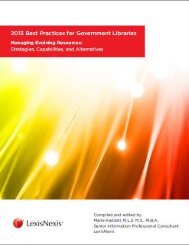2012 Best Practices for Government Libraries
2012 Best Practices for Government Libraries
2012 Best Practices for Government Libraries
You also want an ePaper? Increase the reach of your titles
YUMPU automatically turns print PDFs into web optimized ePapers that Google loves.
61<br />
BEST PRACTICES <strong>2012</strong><br />
Every year, we are increasingly dealing with generations who have grown up<br />
immersed in technology, and the ability to access and create in<strong>for</strong>mation. That<br />
ability is something that is assumed by younger generations. They’ve always been<br />
able to create video, upload it to YouTube or Facebook, and share it. Further,<br />
content created on the Internet spills over into our “traditional” media. Books are<br />
created out of blogs (1000 Awesome Things), and out of Twitter feeds (Sh** My<br />
Dad Says). Internet “memes” seem to come out every week, leading to millions of<br />
views, and millions of people viewing content created by “unknowns.” Can you<br />
imagine this dynamic happening even 20 years ago? Yet this is the world that is<br />
second nature to an increasing number of our users, and we need to deeply<br />
understand that.<br />
A parallel phenomenon is street or guerilla art, probably best illustrated by the<br />
British artist Banksy, known paradoxically <strong>for</strong> his anonymity and the wide<br />
recognition of his work. No one knows who he is (supposedly), yet he continues to<br />
create content and be widely praised <strong>for</strong> it. Similarly, Los Angeles street artist<br />
Shepard Fairey created an icon out of his street using an image of Andre the Giant.<br />
Now you can buy bumper stickers with this image on it.<br />
My point in connection with pushing boundaries is that we simply would not have<br />
this art as part of our lexicon without someone doing something they weren’t<br />
“supposed” to do. Ordinary people are creating content and creating a world of their<br />
own. Why aren’t we as in<strong>for</strong>mation professionals?<br />
So what do we do going <strong>for</strong>ward? Beginning to expand our boundaries<br />
I am a proponent of librarians, in<strong>for</strong>mation professionals, and libraries pushing<br />
boundaries. In order to keep ourselves vital to our users and our communities, and<br />
simply to keep ourselves interested in what we do, we need to push our own<br />
boundaries on a regular basis. Granted, especially in government work, there can<br />
be a lot of constraints and potential consequences to not “following the rules.” Yet I<br />
think we more often restrict ourselves from pushing our own boundaries.<br />
There is no blanket solution <strong>for</strong> “pushing your boundaries” <strong>for</strong> all libraries, and so I<br />
don’t feel I can really provide specifics. Each library and in<strong>for</strong>mation organization<br />
has to determine how it moves <strong>for</strong>ward, because each has its own situation,<br />
audience, and guidelines. That said, I do have some thoughts about approach and<br />
perspective to pushing your own boundaries as an in<strong>for</strong>mation organization.<br />
Be willing to question everything, with detachment and without<br />
judgment. And I mean everything. Most of us have “sacred cows” – services,<br />
resources, ideas – that we don’t allow ourselves to even think about<br />
changing or letting go. Keep in mind – questioning and examining are not the<br />
same as actually taking action. It’s simply opening up the conversation.<br />
Get a good understanding of the new landscape. Take a good look at<br />
what’s happening out there, not just in the library world, but in business and<br />
industry, in the arts, in brain research, in a variety of disciplines. This kind of<br />
cross-pollination will allow you to better understand the world and to gain<br />
ideas on how to creatively push your own boundaries.



